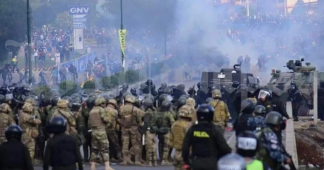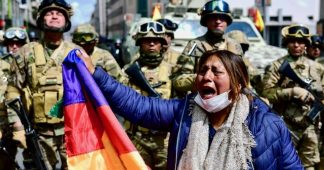Translated via Google Translate
Read the article in Spanish
CHILE: “HOW CAN YOU PACT FOR A NEW CONSTITUTION WHEN THE PEOPLE ARE AGAINST?”
Analysis by James Petras
on CX36, November 19, 2019
In Chile “we have two forces in the opposition: on the one hand the parliamentarians who want to agree with Piñera and on the other hand, the social movements and the youth that are in combat,” said the American sociologist, Professor James Petras, in his weekly column pro CX36. He noted that the agreement signed between the government and opposition legislators has no future. “How can they agree on a new Constitution when the people are against it, when the streets are full and when a million and a half people have marched against Piñera?” He asked and sentenced that “I think he has no chance “ He also analyzed the situation that Bolivia and Ecuador are going through; as well as what happens in US domestic politics, where he said the impeachment process against Donald Trump is moving forward. We transcribe this analysis of the international situation that can be heard again here:
https://archive.org/details/20191119jamespetras
Hernán Salina: James Petras as always a pleasure to receive it from Radio Centenario de Montevideo. Good morning, James.
James Petras: Good morning to you, I hope that with the summer you are having a good time in Montevideo.
HS: Well, alternating the heat with some rain in the week before the second round of the elections, to the ballot.
The truth is that issues are not lacking, issues that require deep analysis. Let’s start with the situation in Bolivia, where mobilizations are reinforced, protests against the coup government, while Evo Morales says from Mexico that he does not rule out returning. What changes can be highlighted at this stage of what is happening?
JP: There are several things.
First that the mobilizations in Bolivia are growing, not only the peasants, but in El Alto which is a city very close to La Paz, there are protests in Cochabamba and other places. And I think that the opposition, the Evo Morales officials, are gaining strength and the government of the political self-titled are in retreat.
We could not rule out a civil war, because in reality there are three different forces in the coup: there are the military who are displaced; there is a group of military personnel who are now directing the self-titled president JeanineÁñez, and I think we could say that there are conflicts and differences between politicians and the different military groups. Meanwhile, Washington continues to support the coup, the most extremist and (Donald) Trump has announced that the United States will appear in Bolivia to lead the coup.
We can also say that the opposition is gaining strength and they have the possibility of obtaining armed support among the military. But in the meantime we can say that the murders continue to multiply, we already have 23 dead and the police are very discredited and have no support among the population. And that is very important.
The wealthy middle class and the upper class, focused on Santa Cruz, are looking for ways to use paramilitaries to strengthen repression in the typical Bolivian style.
Therefore, we could say that the repression is deepening, radicalizing on both sides: the extreme right backed by Washington and the other side; and on the other the workers, the peasants, the natives, the workers of the countryside and the city, as well as those who have left the countryside and live in the city and are another popular force.
Nobody wants the military and the politics of the extreme right to return because it is going to reverse all the advances that the people have achieved during the presidency of Evo Morales.
The only international support (that the coup government has) apart from that of the United States, is that of Luis Almagro, the Uruguayan, supposed representative of the OAS (Organization of American States), who as a spokesman for Washington is very discredited, is a person rotten that represents the worst of inter-Americanism.
HS: Is there any impact on the US? What about the role Donald Trump plays in the coup in Bolivia?
JP: Well, it is clear that Donald Trump and the hawks in his government have long been supporting a coup. It is not something new, it is something that began more than ten years ago when they tried to knock down President Morales in 2009. But we can say that at least, the Democratic Party – his left wing – particularly Bernie Sanders a candidate who seeks Presidency with a support of 20 or 25% of the electorate, has declared against the coup and supporting Evo Morales.
Then we could say that at least the Democratic Party on its left wing, supports Evo Morales and opposes the coup.
Republicans support the coup and big capitals want to return to Bolivia to get their national resources and also seek to support the coup to avoid protests.
HS: We are going to Chile, where the government tries to show as a ‘historic agreement’ reached with opposition parties, for a referendum that amends the Constitution, however from the mobilized social movements gathered in what they call Social Unity, it has rejected. Can you advance this process to a month of protests?
JP: In Chile there are several forces at play. First, the large majorities, which include a large number of people in the streets, with mobilizations of more than 1.5 million people, are against an agreement imposed (Sebastián) Piñera with the opposition that is in Parliament, including the Communist Party, which has condemned the most radicalized mobilizations. Then we have two opposing forces: on the one hand the parliamentarians who want to agree with Piñera and on the other hand, the social movements and the youth that are in combat.
We could also say that things have been radicalized, the Piñera police have killed more than 23 people, there are more than 200 people who have lost their sight (because of the police bullets); and there are a huge number of people who are sympathizing with the protesters.
I think that Piñera has no support in any popular sector beyond the richest. Surveys show that it has a 13% popularity, that is 87% are critical or directly reject Piñera, so how can they agree on a new Constitution when the town is against, when the streets are full and when a million and a half people have marched against Piñera?
I think he has no chance.
Beyond that, Piñera is cornered because she has no chance of appealing to the people when we have even lost eyes, so many dead, so many imprisoned. Piñera had to criticize the police – in a small degree – to try to separate from the murderers.
HS: To end Latin America, let’s look a little at Ecuador where the Lenin Moreno government has received a political defeat in its attempt to implement economic reforms and it seems that they are reviving the mobilizations. There are those who say that Lenin Moreno does not have much left in the government.
JP: Yes, there are mobilizations by CONADI (National Corporation for Indigenous Development) and all indigenous and peasant organizations, but we must recognize that in Quito and other large Ecuadorian cities, there are large pending protests. And I think that the agreements with Lenin Moreno have already ended because they have not had any positive reform, the concessions are evaporating, the possibilities of solving problems do not exist. I think that the mobilizations are going to surround more and more Guayaquil, where Lenin Moreno is hidden. I think that in less than a year, maybe three or six months, Lenin Moreno will fall because he has lost the support of the field, he is losing the support of the big cities, on the coast the oil tankers and other sectors also begin to mobilize. What is left to Lenin Moreno is the military, which until now has been an incognito factor in the face of the possibility of facing the people. I think Ecuador is going to take the same path from Chile and Bolivia.
And that could have repercussions in other countries like Brazil; and in Argentina, although there is a change, there are many expectations and we will see if Fernández-Fernández has the capacity to reach the height of starting some reforms, but we have doubts because they have held meetings with the Monetary Fund and they may ask for the renegotiation of debt and some concessions of that nature. But the people are hungry, they are in poverty and they will need much more than some small temporary concessions.
HS: We wanted to highlight a fact that happened at Harvard University, when Israeli consul Dani Dayan tried to give a talk about the Israeli settlement project at Harvard Law School in New York, and more than one hundred students withdrew from the Hall with posters that read: “Settlements are a war crime.” This shows that at the student level, even at Harvard, there is some awareness of the crimes Israel commits.
JP: Yes, there are several things that you have touched. But I will comment that Harvard is not only an elite university, but there are 20 or 25% Jewish students. That is an important factor that these students who stand up to reject the Israeli genocide, because many Harvard professors, particularly the Zionists, have an influence on the public but not in their own classrooms and there is a division between Jewish students and Jewish professors.
(Alan) Dershowitz is a professor of Law and Criminal Law, he is a leader of the extreme right in Middle Eastern politics and despite Dershowitz there are a huge number of Law students who have condemned Israel. That implies that Israel has lost a large mass of Jewish students and there are chances of other Jewish organizations being formed against Israel.
HS: Are there other topics that you want to comment on at the end of this column?
JP: We could note that the impeachment process is moving against Trump. Congress is scheduling publications in all the media, presenting witnesses who are condemning Trump, saying he is a liar, who was involved in trying to influence Ukraine to investigate the opponent (Joe) Biden. In that sense the impeachment process advances at least in the judgments on television.
But beyond that we have the possibility that the process can get some Republican sectors that can create the majority to expel Trump from the Presidency. But in the meantime, we have another Democratic Party candidate who is billionaire (Michael) Bloomberg who has his own influence on Wall Street.
So from Wall Street to the popular classes there is a growing opposition against Trump. Meanwhile, he remains very aggressive and has offered to attend congressional investigations to insult them. And that is a daily factor in all the media, the people are listening and deciding how to treat Trump and his presidential candidacy for the next election.
HS: Well, James, as always, it’s a pleasure to listen to you, to communicate with you from Montevideo. We send you a hug and see you next week.
JP: A hug for you too. Thank you.
(*) The American sociologist, Professor James Petras, analyzes weekly the international reality exclusively in Spanish by CX36 Radio Centenario. You can listen to this analysis on Tuesdays at 11:30 am (local) by 1250 AM of the Uruguayan Dial and by www.radio36.com.uy since the station transmits online 24 hours a day.











